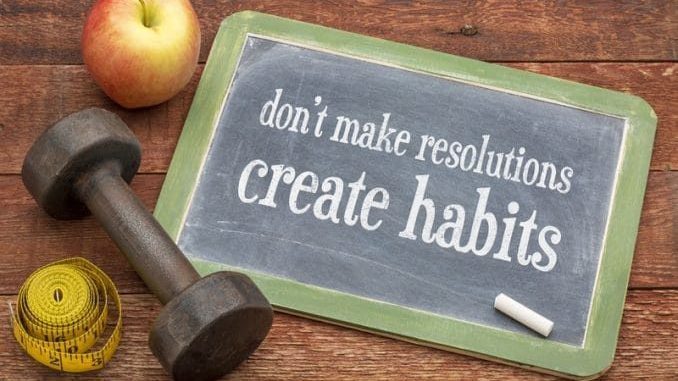
What would you like to change in the New Year? Would you like to lose weight? Get fit? Feel more energy?
If so, you’re not alone. According to a 2015 Nielsen survey, the most common New Year’s resolutions had to do with getting in shape, losing weight and enjoying life to the fullest.
We all want to feel our best. Unfortunately, many of us aren’t sure how to make that happen. Respondents to a Cleveland Clinic survey said they were confused by all the advice and pressure to be perfect and longed for simple information and guidance about health.
More than half (63 percent) stated that there was too much conflicting information, and they needed help determining the best methods for improving their health.
If you’re confused, you’re not alone, but don’t let that stop you from trying. Setting goals is a proven strategy for making positive changes in your life, so below you’ll find some of that clear advice you may be craving about four of the best resolutions you can set, and how to make sure they stick.
1. Think Differently About Vegetables
For decades you’ve had “a side” of veggies, but now it’s better to fill up half your plate with them. Countless scientific studies have found that eating more veggies is the key to long-term health and wellness, avoiding disease, and even extending your life.
The recommended number of servings per day is five, but many diets recommend up to 11 for optimal health.
How to Make It Stick
Follow these tips to get more veggies into your life easily:
- Snack on vegetables: Try carrots or cucumbers dipped in hummus, celery with peanut butter, or a small cup of vegetable soup.
- Use spaghetti squash or spiralized vegetables instead of noodles in your spaghetti, fettuccine or linguini dishes.
- Bake homemade chips with beets, sweet potatoes, or kale.
- Stock up on frozen veggies: They’re quick, easy, and just as nutritious as fresh veggies as long as they don’t have creams or sauces added.
- Add vegetable soup to the menu more often.
- When eating out, ask for a side of veggies or a side salad instead of the typical fried dish.
- Add more veggies to your sauces, including marinara and cream sauces. Good choices include mushrooms, onions, carrots, and bell peppers.
- Blend some veggies into your smoothies.
- Add more veggies to your casseroles.
- Cook a veggie omelet.
2. Move More
Exercise is super-important, but recent studies are showing that movement throughout the day is equally as important. This is where many of us are struggling these days because technology has led to us being the most sedentary generation that’s ever existed. That’s bad news as all that sitting is killing us.
In one study of nearly 8,000 adults, scientists found that greater sedentary time and longer sedentary durations were each associated with higher all-cause mortality risk. The researchers concluded that we all need to not only reduce the amount of time we spend being sedentary, but we also need to interrupt each sedentary period more often with activity to improve health and longevity.
Even if you’re exercising the recommended 30 minutes a day, that still leaves a lot of time that you could be spending in a sedentary manner, and this is dangerous for your health. The problem becomes not the time we spend exercising, but the time we spend not moving at all. Some studies have suggested that your 30-minute exercise routine will not fully counteract hours of sitting, meaning we still have more to do to add movement into our lives.
How to Make It Stick
So, how much movement is enough? This is where we can get confused. Fortunately, there are some guidelines. In the study mentioned above, those participants whose time spent sitting lasted for less than 30 minutes at a stretch had a lower risk of premature death than those who sat longer than that, even if the total hours of sitting were the same.
Based on these findings, the researchers suggested moving around every 30 minutes. Set an alarm if you need to, and when it goes off, get up from your desk or wherever you are and walk around, do some jumping jacks, jump rope, walk around the block, or whatever you want to do. The point is to move for about 5 minutes ― longer if you can ― before returning.
Throughout your day, get used to getting up and moving around every 30 minutes. Your health will benefit.
3. Get More Sleep
The Centers for Disease Control and Prevention (CDC) states that sleep deprivation is so pervasive among adults in today’s world that the issue qualifies as a public health epidemic. Research by the CDC showed that a third of United States adults usually get less than the recommended seven to eight hours of sleep per night.
Chronic sleep deprivation has been linked with type 2 diabetes, heart disease, obesity, depression, increased motor vehicle crashes, and mistakes at work. In a 2010 review of 16 studies, including more than 1.3 million participants, scientists found that a short sleep duration of five hours or less was associated with a greater risk of death as was a long sleep duration of more than eight hours per night.
Getting enough — but not too much — sleep is a priority for overall physical and mental health.
How to Make It Stick
If you’re having trouble sleeping, talk to your doctor about it, as it is a serious matter. Meanwhile, try these tips to improve your odds of getting your seven to eight hours per night:
- Get some sun: The more bright light exposure you get during the day, the better you’ll sleep at night.
- Make it dark: Just like you need more light during the day, you need less at night. About two hours before bed, dim the lights to tell your brain it’s almost time to sleep.
- Shut off the gadgets: Televisions, computers, tablets, most e-readers, and cellphones all emit blue light, which messes with the sleep hormone melatonin. Using these tools before bed interferes with your sleep. Turn them all off two hours before bed and keep them out of the bedroom.
- Exercise: It helps work your muscles so that they’re more likely to want to relax at night.
- Cut off the caffeine and alcohol: Both of these can interfere with quality sleep, so try to avoid them by the late afternoon.
- Create a sleep schedule: Get up and go to bed at the same time every day, even on weekends.
- Stick with a before-bed routine: Your brain and body run on habit, so if you create a before-bed routine that you repeat every night, it will help you to shut down and sleep. Consider doing something calming like a yoga or meditation routine, taking a warm bath or shower, and enjoying a quiet activity like reading, knitting or something that helps you relax.
- Try a melatonin supplement: If you’re struggling with insomnia, these may help. Take up to 5 milligrams about 30 to 60 minutes before bedtime.
- Try tea: Some herbal teas are known to be calming and relaxing and may help you fall asleep. Try chamomile, valerian, passionflower, lemon balm, and lavender.
- Optimize your bedroom: Make sure your mattress is comfortable ― any older than eight years should be replaced ― and that your room is cool, dark and quiet. If you live in a noisy neighborhood, try a white noise device or fan.
- Avoid late-night snacking: It triggers digestive processes that can keep you awake. Stick with water and herbal tea or perhaps a very small serving of milk before bed.
4. Don’t Forget Your Mental Health
We don’t often think about it, but mental well-being is just as important as physical fitness when it comes to long-term health and happiness. According to Mental Health First Aid USA, almost half of adults (46.4 percent) will experience a mental illness during their lifetime. Half of these begin by age 14, and three-quarters by the age of 24.
Older adults are not exempt. The World Health Organization (WHO) states that about 15 percent of adults aged 60 and over suffer from a mental disorder.
But it’s not only about disorders. Physical health isn’t only about avoiding disease, and mental health isn’t only about avoiding mental illness. We all want to feel strong, happy and on purpose in our lives, and tending to our mental health helps us to improve our odds of feeling that way.
How to Make It Stick
All of the following practices can help you improve mental health, boost mood and keep your brain functioning well into old age:
- Meditate: It eases anxiety and stress, slows or may even stall the changes that take place in the brain due to normal aging, increases the brain’s ability to process information and enhances concentration. Your practice doesn’t have to be complicated. Take 10 minutes a day to sit quietly and breathe. Let other thoughts come and go without reacting to them. You can use a candle flame to focus on if you like.
- Keep a gratitude list: Writing down what you’re grateful for regularly has been found in studies to improve mental health as well as happiness. It also helps lower stress and anxiety.
- Increase face-to-face social interaction: Social media is fine for some things, but if you use it too much, it can lead to depression. Human brains crave companionship, and studies have found that quality interactions can reduce stress, boost mood, lower your risk of depression and more. Tend to your family and friendships and join new groups or volunteer to meet new people.
- Practice a daily stress-relieving activity: Stress never disappears completely, so it’s best to learn to cope with it. Pencil in a good stress-relieving activity into each day. Options include meditation, yoga, tai chi, walks ― particularly in green spaces ― time with friends, time with your pets, listening to your favorite music or anything else that helps you shed stress and feel better about your life.
Find Purpose and Meaning
Those who feel they’re using their strengths, skills, and talents to give back to others often report better mental health than those who don’t feel they’re needed or acting with purpose. Try to engage in work that provides meaning to yourself and others, even if you do it on your own time outside of your job. Try new activities that challenge your creativity, make you feel productive, help you build relationships or improve the lives of others.
For help sticking to your healthy eating resolutions, make sure to pick up your free copy of our New Year’s Cookbook, here!
.





